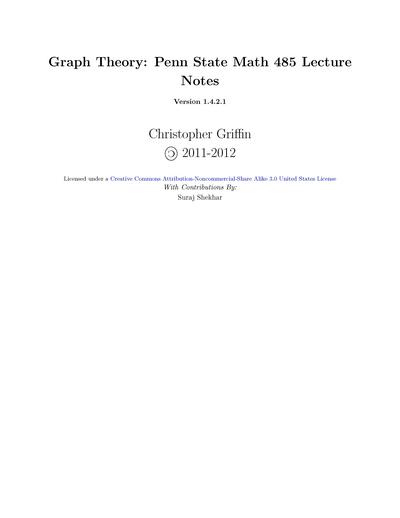
Graph Theory: Penn State Math 485 Lecture Notes
This is a set of lecture notes for Math 485–Penn State’s undergraduate Graph Theory course. Readers should have taken a course in combinatorial proof and ideally matrix algebra.
Tag(s): Graph Theory
Publication date: 31 Dec 2012
ISBN-10: n/a
ISBN-13: n/a
Paperback: 173 pages
Views: 10,965
Type: Lecture Notes
Publisher: n/a
License: Creative Commons Attribution-NonCommercial-ShareAlike 3.0 United States
Post time: 05 Dec 2016 02:00:00
Graph Theory: Penn State Math 485 Lecture Notes
 This is a set of lecture notes for Math 485–Penn State’s undergraduate Graph Theory course. Readers should have taken a course in combinatorial proof and ideally matrix algebra.
This is a set of lecture notes for Math 485–Penn State’s undergraduate Graph Theory course. Readers should have taken a course in combinatorial proof and ideally matrix algebra.
Publication date: 31 Dec 2012
ISBN-10: n/a
ISBN-13: n/a
Paperback: 173 pages
Views: 10,965
Document Type: Lecture Notes
Publisher: n/a
License: Creative Commons Attribution-NonCommercial-ShareAlike 3.0 United States
Post time: 05 Dec 2016 02:00:00
Share — copy and redistribute the material in any medium or format
Adapt — remix, transform, and build upon the material
The licensor cannot revoke these freedoms as long as you follow the license terms.
Click here to read the full license.
Christopher Griffin wrote:The lecture notes are loosely based on Gross and Yellen's Graph Theory and It's Applications, Bollobás' Graph Theory, Diestel's Graph Theory, Wolsey and Nemhauser's Integer and Combinatorial Optimization, Korte and Vygen's Combinatorial Optimization and several other books that are cited in these notes. All of the books mentioned are good books (some great). The problem is, they are either too complex for an introductory undergraduate course, have odd notation, do not focus enough on applications or focus too much on applications.
This set of notes correct some of the problems I mention by presenting the material in a format for that can be used easily in an undergraduate mathematics class. Many of the proofs in this set of notes are adapted from the textbooks with some minor additions. One thing that is included in these notes is a treatment of graph duality theorems from the perspective linear optimization. This is not covered in most graph theory books, while graph theoretic principles are not covered in many linear or combinatorial optimization books. I should note, Bondy and Murty discuss Linear Programming in their book Graph Theory, but it is clear they are not experts in optimization and their treatment is somewhat non sequitur, which is a shame. The best book on the topic of combinatorial optimization is by far Korte and Vygen's, who do cover linear programming in their latest edition. Note: Penn State has an expert in graph coloring problems, so there is no section on coloring in these notes, because I invited a guest lecturer who was the expert. I may add a section on graph coloring eventually.
Tweet
About The Author(s)
Assistant Professor of Mathematics at United States Naval Academy. Research interests include applications of game theorey, optimization and mathematical logic to problems of national security and the intelligence community.
Assistant Professor of Mathematics at United States Naval Academy. Research interests include applications of game theorey, optimization and mathematical logic to problems of national security and the intelligence community.